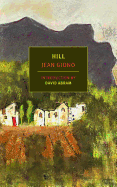
Hill, Jean Giono's first novel, won the Prix Brentano in 1929 and has been newly translated into English by Paul Eprile. Focused on the conflict between humans and nature in a tiny French village, the story's imagery and atmosphere offer a thrilling, disturbing, visceral experience in an unassuming package.
A small Provençal hamlet known as the Bastides Blanches (the White Houses), or simply the Bastides, has been for some time slouching back toward a state of nature. In these crumbling houses now live four families comprising a dozen residents--plus one, a mute vagabond they call Gagou, "who throws off the reckoning." The eldest resident, an old man named Janet, falls ill, takes to his bed, and here the troubles begin: an ill omen is noted, the town's water supply runs dry, and the surrounding landscape takes on a sinister cast. Janet begins to speak in tongues, and "in the old man's talk there are chasms where untold powers rumble." The men of the village meet to strategize as the natural world encircling the Bastides advances.
Hill runs just over 100 pages, but its impact is powerful. Giono sketches his characters sparingly. The character of Gagou presents ominous questions that are left unanswered: Are his differences malevolent, or merely another force of nature? The individualities of human characters are not the point; instead, this story is about the shape of the world, the breadth and agency of nature independent of humankind. Eprile's translation emphasizes language and a brooding tone. The result is a curious, intriguing novel of wind, earth, water and fire, both threatening and luminous. --Julia Jenkins, librarian and blogger at pagesofjulia

